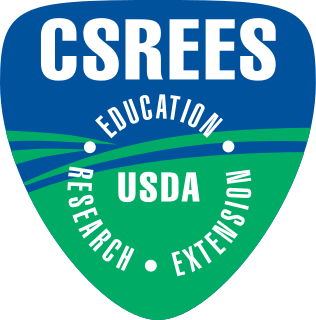Related Research Articles

The United States Department of Agriculture (USDA), also known as the Agriculture Department, is the federal executive department responsible for developing and executing federal laws related to farming, forestry, rural economic development, and food. It aims to meet the needs of commercial farming and livestock food production, promotes agricultural trade and production, works to assure food safety, protects natural resources, fosters rural communities and works to end hunger in the United States and internationally.

The Agricultural Research Service (ARS) is the principal in-house research agency of the United States Department of Agriculture (USDA). ARS is one of four agencies in USDA's Research, Education and Economics mission area. ARS is charged with extending the nation's scientific knowledge and solving agricultural problems through its four national program areas: nutrition, food safety and quality; animal production and protection; natural resources and sustainable agricultural systems; and crop production and protection. ARS research focuses on solving problems affecting Americans every day. The ARS Headquarters is located in the Jamie L. Whitten Building on Independence Avenue in Washington, D.C. and the headquarters staff is located at the George Washington Carver Center (GWCC) in Beltsville, Maryland. For 2018, its budget was $1.2 billion.
The Substance Abuse and Mental Health Services Administration is a branch of the U.S. Department of Health and Human Services. It is charged with improving the quality and availability of treatment and rehabilitative services in order to reduce illness, death, disability, and the cost to society resulting from substance abuse and mental illnesses. The Administrator of SAMHSA reports directly to the Secretary of the U.S. Department of Health and Human Services. SAMHSA's headquarters building is located outside of Rockville, Maryland.

Hazard analysis and critical control points, or HACCP, is a systematic preventive approach to food safety from biological, chemical, and physical hazards in production processes that can cause the finished product to be unsafe and designs measures to reduce these risks to a safe level. In this manner, HACCP attempts to avoid hazards rather than attempting to inspect finished products for the effects of those hazards. The HACCP system can be used at all stages of a food chain, from food production and preparation processes including packaging, distribution, etc. The Food and Drug Administration (FDA) and the United States Department of Agriculture (USDA) require mandatory HACCP programs for juice and meat as an effective approach to food safety and protecting public health. Meat HACCP systems are regulated by the USDA, while seafood and juice are regulated by the FDA. All other food companies in the United States that are required to register with the FDA under the Public Health Security and Bioterrorism Preparedness and Response Act of 2002, as well as firms outside the US that export food to the US, are transitioning to mandatory hazard analysis and risk-based preventive controls (HARPC) plans.
The United States Pharmacopeia (USP) is a pharmacopeia for the United States published annually by the United States Pharmacopeial Convention, a nonprofit organization that owns the trademark and also owns the copyright on the pharmacopeia itself. The USP is published in a combined volume with the National Formulary as the USP-NF. If a drug ingredient or drug product has an applicable USP quality standard, it must conform in order to use the designation "USP" or "NF". Drugs subject to USP standards include both human drugs and animal drugs. USP-NF standards also have a role in US federal law; a drug or drug ingredient with a name recognized in USP-NF is considered adulterated if it does not satisfy compendial standards for strength, quality or purity. USP also sets standards for dietary supplements and food ingredients. USP has no role in enforcing its standards; enforcement is the responsibility of the U.S. Food and Drug Administration (FDA) and other government authorities in the United States.
Quality Assurance International (QAI) is a U.S.-based international organic certification company that is authorized by the United States Department of Agriculture (USDA) as "a USDA-accredited certifying agent that operates globally to certify organic operations to National Organic Program standards." It is a for-profit corporation, established in 1989, and headquartered in San Diego, California. It is one of the world's largest certifiers, operating in the United States, Canada, Latin America, European Union, and Japan. It is owned by public health and environmental organization NSF International.

The Agency for Healthcare Research and Quality is one of twelve agencies within the United States Department of Health and Human Services (HHS). The agency is headquartered in North Bethesda, Maryland, a suburb of Washington, D.C.. It was established as the Agency for Health Care Policy and Research (AHCPR) in 1989 as a constituent unit of the Public Health Service (PHS) to enhance the quality, appropriateness, and effectiveness of health care services and access to care by conducting and supporting research, demonstration projects, and evaluations; developing guidelines; and disseminating information on health care services and delivery systems.
The Agricultural Marketing Service (AMS) is an agency of the United States Department of Agriculture; it maintains programs in five commodity areas: cotton and tobacco; dairy; fruit and vegetable; livestock and seed; and poultry. These programs provide testing, standardization, grading and market news services for those commodities, and oversee marketing agreements and orders, administer research and promotion programs, and purchase commodities for federal food programs. The AMS enforces certain federal laws such as the Perishable Agricultural Commodities Act and the Federal Seed Act. The AMS budget is $1.2 billion. It is headquartered in the Jamie L. Whitten Building in Washington, D.C.

The Richard B. Russell National School Lunch Act is a 1946 United States federal law that created the National School Lunch Program (NSLP) to provide low-cost or free school lunch meals to qualified students through subsidies to schools. The program was established as a way to prop up food prices by absorbing farm surpluses, while at the same time providing food to school age children. It was named after Richard Russell, Jr., signed into law by President Harry S. Truman in 1946, and entered the federal government into schools' dietary programs on June 4, 1946.

Food policy is the area of public policy concerning how food is produced, processed, distributed, purchased, or provided. Food policies are designed to influence the operation of the food and agriculture system balanced with ensuring human health needs. This often includes decision-making around production and processing techniques, marketing, availability, utilization, and consumption of food, in the interest of meeting or furthering social objectives. Food policy can be promulgated on any level, from local to global, and by a government agency, business, or organization. Food policymakers engage in activities such as regulation of food-related industries, establishing eligibility standards for food assistance programs for the poor, ensuring safety of the food supply, food labeling, and even the qualifications of a product to be considered organic.
A patient safety organization (PSO) is a group, institution, or association that improves medical care by reducing medical errors. Common functions of patient safety organizations are data collection and analysis, reporting, education, funding, and advocacy.

The Swiss Tropical and Public Health Institute or Swiss TPH is an international public health institute working in various disciplines with a particular focus on low- and middle-income countries. It was founded in 1943 through the initiative of Rudolf Geigy. Swiss TPH endeavors to the improve the health of populations internationally and nationally through research, services, education, and training, with a focus on developing countries.
The Association of Local Colleges and Universities or simply ALCU is composed of forty (40) local colleges and universities of the Philippines. ALCU is working closely with the Senate Committee on Education, which is headed by Senator Alan Peter Cayetano, in legislations that benefit existing local colleges and universities.

The Ministry of National Health Services, Regulation and Coordination is a cabinet level ministry of the Government of Pakistan with responsibility for national public health.

The National Aquaculture Act of 1980 is intended to promote and support the development of private aquaculture and to ensure coordination among the various federal agencies that have aquaculture programs and policies. It provided for a national aquaculture policy, including a formal National Aquaculture Development Plan; established a Joint Subcommittee on Aquaculture on which officials of USDA, Commerce, the Interior, and nine other federal agencies sit; designated USDA as the lead agency for coordination; and authorized the National Aquaculture Information Center within the National Agricultural Library.
Organic aquaculture is a holistic method for farming fish and other marine species in line with organic principles. The ideals of this practice established sustainable marine environments with consideration for naturally occurring ecosystems, use of pesticides, and the treatment of aquatic life. Managing aquaculture organically has become more popular since consumers are concerned about the harmful impacts of aquaculture on themselves and the environment.

The Food Safety and Inspection Service (FSIS), an agency of the United States Department of Agriculture (USDA), is the public health regulatory agency responsible for ensuring that United States' commercial supply of meat, poultry, and egg products is safe, wholesome, and correctly labeled and packaged. The FSIS draws its authority from the Federal Meat Inspection Act of 1906, the Poultry Products Inspection Act of 1957 and the Egg Products Inspection Act of 1970. The FSIS also acts as a national health department and is responsible for the safety of public food-related establishments as well as business investigation.
Biosecurity in the United States is governed by the Bureau of Western Hemisphere Affairs, which is part of the US Department of State. It obtains guidance and advice on specific matters relating to biosecurity from various other government agencies.
The National Interagency Confederation for Biological Research is a biotechnology and biodefense partnership and collaborative environment of eight U.S. Federal government agencies at Fort Detrick, Maryland, USA.

The Cooperative State Research, Education, and Extension Service (CSREES) was an extension agency within the U.S. Department of Agriculture (USDA), part of the executive branch of the federal government. The 1994 Department Reorganization Act, passed by Congress, created CSREES by combining the former Cooperative State Research Service and the Extension Service into a single agency.
References
 This article incorporates public domain material from the Congressional Research Service document: Jasper Womach. "Report for Congress: Agriculture: A Glossary of Terms, Programs, and Laws, 2005 Edition" (PDF).
This article incorporates public domain material from the Congressional Research Service document: Jasper Womach. "Report for Congress: Agriculture: A Glossary of Terms, Programs, and Laws, 2005 Edition" (PDF).